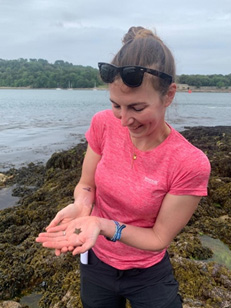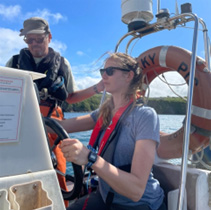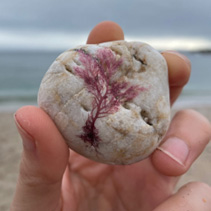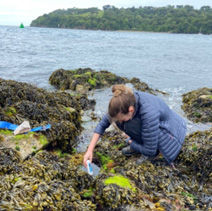Nell Pates is an undergraduate student on the BSc Biological Sciences course in the Department of Life Sciences.
Here Nell reflects on a week spent in Plymouth for the marine ecology field course, part of the Ecological Field Skills second year optional module.
By Nell Pates
 The week we spent in Plymouth for the marine ecology field course was the best of my degree so far. The course was exhausting at times but also incredibly interesting and fun.
The week we spent in Plymouth for the marine ecology field course was the best of my degree so far. The course was exhausting at times but also incredibly interesting and fun.
We spent about half our time learning new things. We visited different marine habitats and learned field skills both on the shore and out at sea on boats.
The other half of the time, we were given almost complete freedom to do our group work, applying what we had learned to whichever marine environment interested us the most.
My group chose the rocky shore: we designed an experiment to study the effects of plastic litter on rockpools, bought the kit we needed, then ran two days of sampling to gather our data.
The staff were always around to help if we needed them, but it was up to us how and when we got the work done. Having that space gave us a real sense of independence and ownership over the project, and it was something we could be proud of when we analysed our data for the write-up.
Why I’m going to keep studying ecology…
 The thing about studying ecology is that it’s like being given a pair of magic goggles that let you see the world in a completely new way.
The thing about studying ecology is that it’s like being given a pair of magic goggles that let you see the world in a completely new way.
You start to appreciate the systems that keep our planet healthy at all these different scales: from the tiniest contributors to photosynthesis in the ocean, plankton (which produce 50% of the oxygen we breathe), all the way up to the big stuff, like how much carbon is sequestered by a giant, ancient oak.
Then there’s all the brilliant, weird, and wonderful species in between (shout out the Behavioural Ecology module that taught me more than I thought I would ever need to know about how bed bugs have sex!).
And the more you learn, the more you start to see patterns in how all these systems link together and interact.
…and you should too!
 The themes of ecology are central to some of the most important issues facing all life on earth. These are going to be the big challenges, probably for the rest of my career: climate change and the biodiversity crisis.
The themes of ecology are central to some of the most important issues facing all life on earth. These are going to be the big challenges, probably for the rest of my career: climate change and the biodiversity crisis.
Ecology affects everything, from the origin and spread of disease, to our food and water security. It’s complicated and messy, but it’s relevant to understanding how the future might look, and that’s important for everyone and everything on earth.
The chance to learn ecology from experts at Imperial is a great one. The lecturers are so passionate, and they have had some of the most incredible, cool careers. Another thing I really appreciated about the field skills module was the opportunity to learn about some of the jobs you can go on to do with ecology.
As well as hearing from the researchers at Imperial and the marine station in Plymouth, we had guest lectures from civil servants doing science for the government, charities running carbon sequestration programmes, and conservationists protecting ocean habitats for wildlife and local communities.
 Ecology is a vast field of study, but the field skills course is a brilliant introduction to the topic, with a huge practical component in the marine field course at Plymouth.
Ecology is a vast field of study, but the field skills course is a brilliant introduction to the topic, with a huge practical component in the marine field course at Plymouth.
Even if you don’t think ecology is what you want to go on to do, I would recommend taking one of the optional second-year modules – you will learn a lot and you won’t regret it!